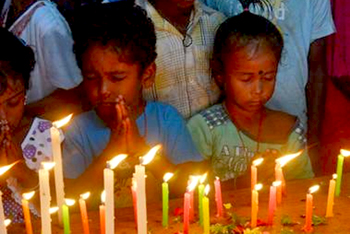 Khao Lak/Thailand, Dec 26: Beachside memorials and religious services were held across Asia on Friday to mark the 10th anniversary of the Indian Ocean tsunami that left more than a quarter million people dead in one of modern history’s worst natural disasters.
Khao Lak/Thailand, Dec 26: Beachside memorials and religious services were held across Asia on Friday to mark the 10th anniversary of the Indian Ocean tsunami that left more than a quarter million people dead in one of modern history’s worst natural disasters.
The devastating December 26, 2004 tsunami struck a dozen countries around the Indian Ocean rim. It eradicated entire coastal communities, decimated families and crashed over tourist-filled beaches the morning after Christmas. Survivors waded through a horror show of corpse-filled waters
As part of Friday’s solemn commemorations, survivors, government officials, diplomats and families of victims gathered in Indonesia, Thailand, Sri Lanka, India and elsewhere.
Moments of silence were planned in several spots to mark the exact time the tsunami struck.
The disaster was triggered by a 9.1-magnitude earthquake, the region’s most powerful in 40 years, that tore open the seabed bed off of Indonesia’s Sumatran coast, displacing billions of tons of water and sending waves roaring across the Indian Ocean at jetliner speeds as far away as East Africa.
Indonesia’s Aceh province was hit first and hardest. The sea rose as high as 10m and surged inland for kilometres with seemingly unstoppable force, carrying along trees, houses, train cars and thousands of people in a churning rush.
Indonesia’s Vice-President Jusuf Kalla attended a ceremony in Banda Aceh, the capital of Aceh Province, on Friday in which sashes were distributed to the ambassadors of countries that assisted in the massive recovery effort 10 years ago.
More than 160,000 people died in Indonesia, more than half of the total 230,000 people killed across the region.
In Thailand, more than 5,000 people were killed, about half of whom were tourists celebrating the day after Christmas on the country’s renowned white-sand beaches.
In Sri Lanka, the water swept a passenger train from its tracks, killing nearly 2,000 people in a single blow. A symbolic recreation of the train journey was planned as part of Friday’s ceremonies.






Comments
Add new comment